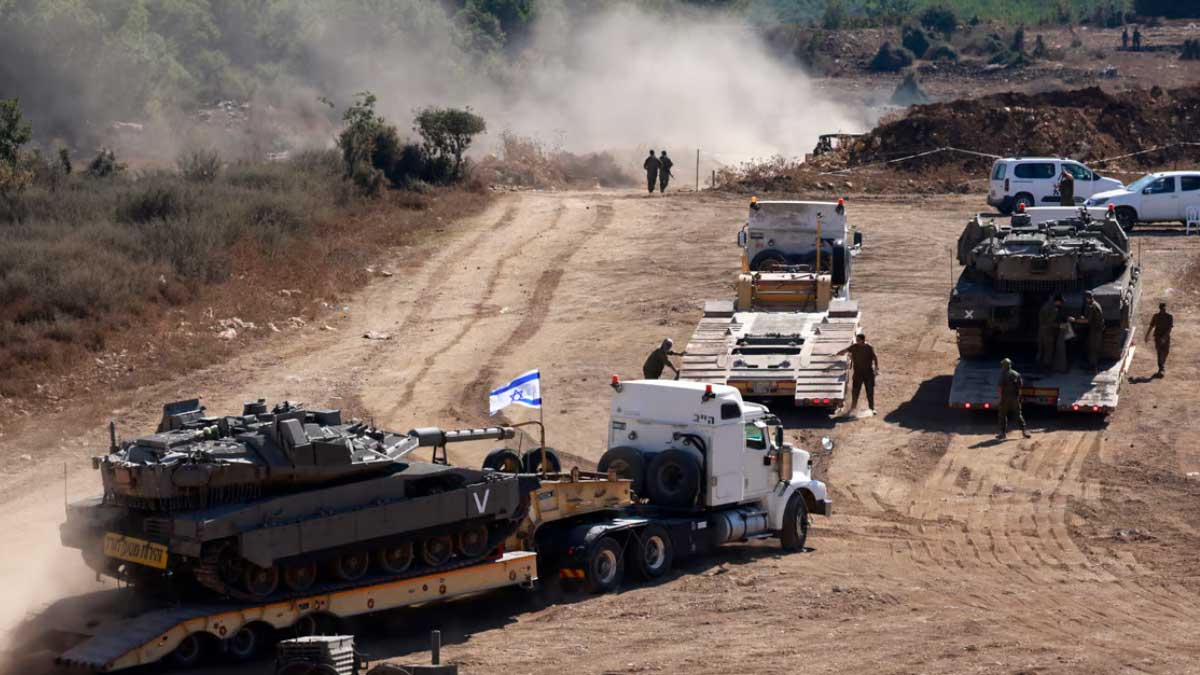- Home
- Billionaires
- Investing Newsletters
- 193CC 1000
- Article Layout 2
- Article Layout 3
- Article Layout 4
- Article Layout 5
- Article Layout 6
- Article Layout 7
- Article Layout 8
- Article Layout 9
- Article Layout 10
- Article Layout 11
- Article Layout 12
- Article Layout 13
- Article Layout 14
- Article Sidebar
- Post Format
- pages
- Archive Layouts
- Post Gallery
- Post Video Background
- Post Review
- Sponsored Post
- Leadership
- Business
- Money
- Small Business
- Innovation
- Shop
Recent Posts
Israeli Forces and Airstrikes Escalate Conflict in Lebanon

Israeli special forces have reportedly carried out small-scale cross-border raids into southern Lebanon, a significant escalation in the ongoing conflict between Israel and Hezbollah. The operations, conducted in recent days, were confirmed by reports from Israeli officials and media sources. These incursions follow earlier statements from Israel’s defense leadership indicating preparations for a potential ground invasion of Lebanon, which could lead to a broader regional conflict.
According to reports in the Wall Street Journal, the primary objective of these raids is intelligence gathering, with special forces entering tunnels along the border between Israel and Lebanon that are believed to be operated by Hezbollah. The infiltration into these tunnels aims to uncover military infrastructure that could be used by Hezbollah in future attacks on Israel. Additionally, the New York Times, citing six unnamed Israeli officials, corroborated the information, noting that the Israeli raids are concentrated on identifying the exact locations of Hezbollah’s military installations, particularly their network of tunnels. The information gathered is expected to play a crucial role in preparing Israeli forces for any future ground or air offensive.
These cross-border raids have reportedly intensified in recent days, signaling a potential prelude to a larger Israeli Defense Forces (IDF) operation in southern Lebanon. According to the Wall Street Journal, these raids have occurred not only in recent weeks but have been happening intermittently for months, reflecting a longer-term Israeli strategy to weaken Hezbollah’s capabilities along the border. The escalation in military activity could lead to a ground invasion, depending on the intelligence gathered and the evolving situation on the ground.
The operations come amidst an intensification of Israeli airstrikes across Lebanon. Most notably, Israel carried out an airstrike on Beirut, the country’s capital, marking the first such attack since the 2006 war between Israel and Hezbollah. Lebanese authorities reported that the airstrikes damaged a residential building in the city, raising concerns about civilian casualties and further destabilization. In another deadly strike, Hamas claimed that Fateh Sherif Abu el-Amin, a senior Hamas leader in Lebanon, was killed alongside his family in an Israeli airstrike on a refugee camp in Tyre, a city in southern Lebanon.
The situation has drawn sharp responses from Hezbollah, a powerful Iran-backed militant group that holds considerable sway in Lebanon’s southern regions. Hezbollah’s deputy leader, Naim Qassem, made a public statement following the death of the group’s leader, Hassan Nasrallah, in an Israeli airstrike on Friday. Qassem announced that Hezbollah would name a new leader soon and asserted the group’s readiness to confront any potential Israeli ground invasion. In his statement, he emphasized that Hezbollah would not only continue to defend Lebanon but would also maintain its support for Hamas in Gaza. He added that the group’s forces were prepared for a ground conflict, should Israel proceed with further escalation.
This marked Hezbollah’s first official statement since the death of Nasrallah, whose leadership had been a defining element in the group’s resistance against Israeli forces. Nasrallah’s death, caused by a targeted airstrike in Beirut’s suburbs, is expected to have profound implications for Hezbollah’s military and political leadership, as well as its strategic operations moving forward. While the group is likely to quickly replace Nasrallah, his loss is considered a major blow to the organization.
Israel’s ongoing air campaign in Lebanon, which began last week, has been accompanied by indications from Israeli officials that a ground invasion could be forthcoming. During a recent visit to Israel’s northern border, IDF Chief of the General Staff Lt. Gen. Herzi Halevi addressed troops, highlighting the importance of the airstrikes in weakening Hezbollah’s positions. He stated that these operations were intended to prepare the ground for potential entry by Israeli forces and to degrade Hezbollah’s capabilities. While no official timeline has been established for a ground invasion, the Wall Street Journal reported that Israel is facing significant pressure from the United States to avoid a full-scale incursion.
The broader conflict between Israel and Hezbollah has raised serious concerns about the potential for a full-blown regional war. The international community, including the United States and France, has called for a ceasefire in Lebanon, but these efforts have been met with resistance from Israel’s leadership. Last week, a group of allied countries proposed a 21-day ceasefire to prevent further escalation. However, Israeli Prime Minister Benjamin Netanyahu rejected the proposal, stating that Israel would continue its military campaign with “full force.” Netanyahu’s stance reflects Israel’s broader determination to eliminate Hezbollah’s military infrastructure and neutralize what it views as an existential threat on its northern border.
The airstrikes in Lebanon have already resulted in hundreds of casualties, and tens of thousands of Lebanese civilians have been forced to flee their homes as the violence intensifies. Many fear that continued Israeli operations could lead to a humanitarian crisis, particularly if the conflict escalates into a prolonged ground invasion.
The current conflict stems from the long-standing hostility between Israel and Hezbollah, which has roots in the broader Israeli-Arab conflict. Hezbollah, which is supported by Iran, has been a major player in Lebanon’s political and military landscape for decades. The group fought a major war against Israel in 2006, which resulted in widespread destruction in Lebanon and significant casualties on both sides. Since then, the group has maintained a formidable presence in southern Lebanon, with its extensive network of tunnels and military infrastructure posing a persistent threat to Israel.
In recent years, tensions between the two sides have escalated, with Hezbollah frequently launching attacks on Israeli targets, and Israel responding with airstrikes. However, the current conflict represents one of the most significant escalations since 2006, with both sides bracing for a potential full-scale war that could have devastating consequences for the region.
As the situation develops, international efforts to broker a ceasefire are likely to continue, but with both Israel and Hezbollah entrenched in their positions, the prospects for a peaceful resolution remain uncertain.
Recent Posts
Categories
- 193 Countries Consortium Partner1
- 193cc Digital Assets2
- 5G1
- Aerospace & Defense48
- AI37
- Arts3
- Banking & Insurance11
- Big Data3
- Billionaires930
- Boats & Planes1
- Business332
- Careers13
- Cars & Bikes79
- CEO Network1
- CFO Network17
- CHRO Network1
- CIO Network1
- Cloud10
- CMO Network18
- Commercial Real Estate7
- Consultant1
- Consumer Tech194
- CxO1
- Cybersecurity73
- Dining1
- Diversity, Equity & Inclusion4
- Education7
- Energy8
- Enterprise Tech29
- Events11
- Fintech1
- Food & Drink2
- Franchises1
- Freelance1
- Future Of Work2
- Games149
- GIG1
- Healthcare79
- Hollywood & Entertainment203
- Houses1
- Innovation46
- Investing2
- Investing Newsletters4
- Leadership65
- Lifestyle11
- Manufacturing1
- Markets20
- Media195
- Mobile phone1
- Money13
- Personal Finance2
- Policy569
- Real Estate1
- Research6
- Retail1
- Retirement1
- Small Business1
- SportsMoney42
- Style & Beauty1
- Success Income1
- Taxes2
- Travel10
- Uncategorized12
- Vices1
- Watches & Jewelry2
- world's billionaires899
- Worlds Richest Self-Made Women2
Related Articles
South Korea Plane Crash: A Tragic Loss and Global Mourning
The tragic plane crash at South Korea’s Muan International Airport on Sunday...
By 193cc Agency CouncilDecember 30, 2024H-1B Visa Debate Splits Trump Allies and Silicon Valley
The debate over H-1B visas has once again become a contentious issue,...
By 193cc Agency CouncilDecember 28, 2024Trump Moves $4B Stake in Truth Social Parent, Stock Drops 6%
Donald Trump recently transferred his 57% stake in Trump Media & Technology...
By 193cc Agency CouncilDecember 20, 2024House Rejects Trump-Backed Funding Bill, Shutdown Looms
The U.S. House of Representatives rejected a new government funding bill on...
By 193cc Agency CouncilDecember 20, 2024













Leave a comment